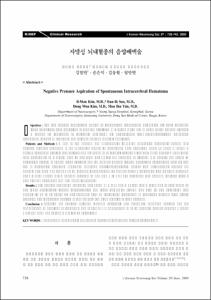KUMEL Repository
1. Journal Papers (연구논문)
1. School of Medicine (의과대학)
Dept. of Neurosurgery (신경외과학)
자발성 뇌내혈종의 음압배액술
- Keimyung Author(s)
- Kim, El; Son, Eun Ik; Kim, Dong Won; Yim, Man Bin
- Department
- Dept. of Neurosurgery (신경외과학)
- Journal Title
- 대한신경외과학회지
- Issued Date
- 2000
- Volume
- 29
- Issue
- 6
- Abstract
- Objectives:The less invasive stereotactic surgery of hypertensive intracerebral hematoma has been preferred. Many techniques were developed to facilitate aspiration of a dense blood clot in acute stage. Authors describe a method for evacuation of putaminal hematoma via computerized tomography(CT)-aided free-hand stereotactic infusion of urokinase and frequent negative pressure aspiration.
Patients and Methods:A total of ten patients with spontaneous putaminal hematoma underwent surgery with negative pressure aspiration in the three-year period. All procedures were performed within 12 hours of insult. A silicone ventricular catheter was inserted into the center of hematoma through a burr hole at the Kocher’s point under local anesthesia. In a typical case of putaminal hematoma, the trajectory of catheter was pointed the center of hematoma parallel to sagittal plane vertically and the external auditory meatus posteriorly. Immediately after the first trial of hematoma aspiration low-dose urokinase solution(2,000IU/5ml saline) was administrated through the catheter and drain was clipped for 30 minutes. Subsequently, the partially liquified hematoma was manually aspirated using a 10ml syringe with a negative pressure of less than 2 to 3ml. The procedure was carefully repeated every 1 hour until the hematoma was near totally evacuated.
Results:The patients population consisted composed of 4 men and 6 women with a mean age of 61.6 years. All had major neurological deficits preoperatively. The mean hematoma volume was 44.3 ml and hematoma was drained for 20 to 48 hours. No complications such as rebleeding, meningitis, or malplaced catheter were noted. Outcome was moderately disabled in four patients and good recovery in three patients.
Conclusion : Although the frequent negative pressure aspiration and low-dose urokinase infusion has the disadvantage of possbility of rebleeding and infection, it is consisdered to be an effective method because it allows a simple, safe, and complete removal of hematoma.
- Alternative Title
- Negative Pressure Aspiration of Spontaneous Intracerebral Hematoma
- Publisher
- School of Medicine
- Citation
- 김일만 et al. (2000). 자발성 뇌내혈종의 음압배액술. 대한신경외과학회지, 29(6), 738–743.
- Type
- Article
- ISSN
- 1225-8245
- Appears in Collections:
- 1. School of Medicine (의과대학) > Dept. of Neurosurgery (신경외과학)
- 파일 목록
-
-
Download
 oak-bbb-1945.pdf
기타 데이터 / 1.75 MB / Adobe PDF
oak-bbb-1945.pdf
기타 데이터 / 1.75 MB / Adobe PDF
-
Items in Repository are protected by copyright, with all rights reserved, unless otherwise indicated.